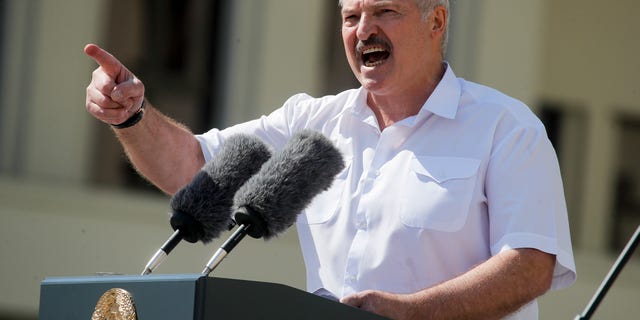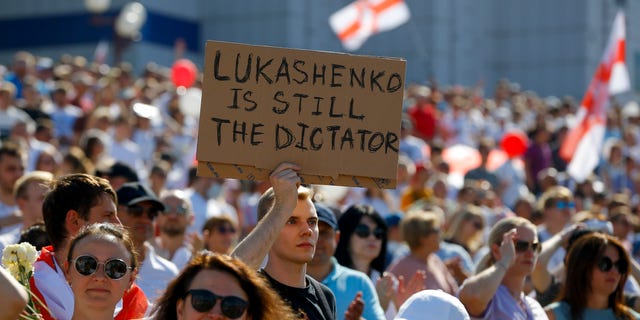Even as protesters continue to swarm to streets of Belarus’s capital, Minsk, and as much of the international community calls for 66-year-old President Alexander Lukashenko to end his 26-year reign, the embattled leader was sworn in for a 6th term in a secret ceremony on Wednesday.
The move comes six weeks after Lukashenko claimed an avalanche win in the election, immediately igniting a firestorm of opposition protests and allegations from numerous foreign governments that the process was fraudulent.
Typically, the swearing-in of a president would be a lavish spectacle, but with a backdrop of controversy and protests, this one was a quiet occasion announced only hours in advance.

Aug. 16, 2020: Belarusian President Alexander Lukashenko addresses his supporters gathered at Independent Square of Minsk, Belarus. European Union leaders are putting on a show of support Wednesday Aug. 19, 2020 for people protesting in Belarus. Emergency talks will aim to highlight their concern about the contested presidential election and ratchet up pressure on officials linked to the security crackdown that followed. The EU believes that the results of the Aug. 9 polls, which handed President Alexander Lukashenko his sixth term with 80% of the vote, “have been falsified,” and the 27-nation bloc is preparing a list of Belarus officials who could be blacklisted from Europe over their roles. (AP Photo/Dmitri Lovetsky)
“The day in which the president takes office, the day of the inauguration, is the day of our joint victory – a convincing and momentous victory,” Lukashenko, often referred to as “Europe’s Last Dictator,” said as he placed his hand on a copy of the constitution, in the presence of several MPs and army generals, official state media reported. “I cannot; I have no right to abandon the Belarusians.”
WHO IS BELARUS PRESIDENT ALEXANDER LUKASHENKO, ‘EUROPE’S LAST DICTATOR’?
Subsequently, anger from the opposition – which has conducted weeks of mass demonstrations demanding rightful elections – only swelled, as protesters carrying signature red-and-white opposition flags convened outside a number of universities demanding their long-running ruler’s resignation.
Moreover, the United States and European Union have echoed the sentiment of a rigged election and are drawing up sanctions against officials involved in the voting process and the ensuing violent clampdown by the security forces.
The United Nations also agreed last week to increase its tracking of reported human rights abuses in Belarus, with rights investigator Anais Marin noting that over 10,000 people had been “abusively arrested” since the election, with more than 500 reports of torture and thousands “savagely beaten.”
BELARUS SEES ANOTHER MASSIVE SUNDAY PROTEST AFTER OPPOSITION LEADER DETAINED
However, Lukashenko has weathered the brunt of the unrest in large part to the staunch backing from neighbor and ally Russia, with Kremlin spokesman Dmitry Peskov announcing Wednesday that the swearing-in was “absolutely the sovereign decision of the Belarusian leadership.”

Aug. 16, 2020: Belarusian opposition supporters rally in the center of Minsk, Belarus. European Union leaders are putting on a show of support Wednesday Aug. 19, 2020 for people protesting in Belarus. Emergency talks will aim to highlight their concern about the contested presidential election and ratchet up pressure on officials linked to the security crackdown that followed. The EU believes that the results of the Aug. 9 polls, which handed President Alexander Lukashenko his sixth term with 80% of the vote, “have been falsified,” and the 27-nation bloc is preparing a list of Belarus officials who could be blacklisted from Europe over their roles. (AP Photo/Sergei Grits)
Lukashenko has domineered the country of 9 million since 1994, taking power right after the fall of the former Soviet Union in 1992 – and has built something of a cult of personality throughout his more than quarter-of-a-century reign. He is known for his charisma, trademark mustache, eccentricities, and self-promotion as a “man of the people.”
During the Soviet era, Lukashenko ran a state farm and thrived on the nickname of “Batka” – meaning father – as he sought to curate an image of a caretaker of the Belarusian people, their animals, and the country’s agriculture and industrial industries in what some analysts consider to be holding on to the Soviet heyday. Yet the fatherly persona also brings with it an eccentric and an authoritarian approach to leadership, experts contend, in which opposition parties are routinely repressed, imprisoned, and sometimes “disappeared” without a trace.







